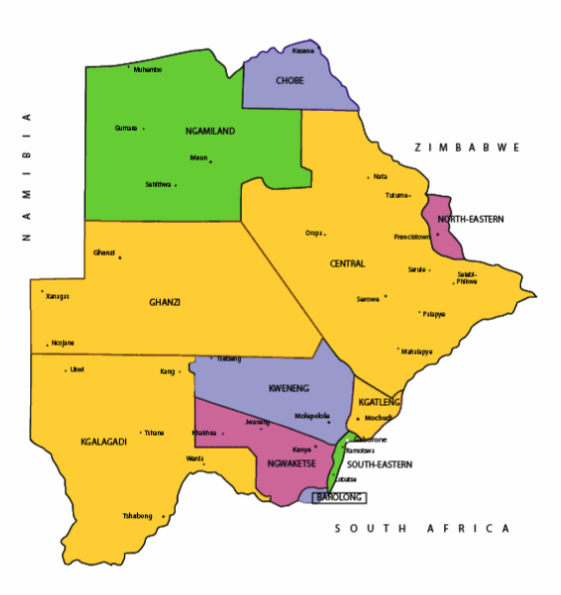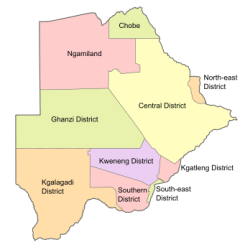Places and their polling stations in Lentsweletau-Mmopane, Botswana
355 Hatsalatladi
1626 Hatsalatladi Primary School
1627 Lepare Borehole
1628 Moselele Mobile Health Stop
1629 Moamogwa Mobile Health Stop
1630 Mogonono Primary School
1631 Moleleme Mobile Health Stop
356 Medie
1632 Medie Primary School
1633 Kweneng Primary School
1634 Moetlo Mobile Health Stop
357 Mahetlwe
1635 Mahetlwe Primary School
1636 Mogatelwane Cattle Crush
1637 Ditshukudu Primary School
1638 Mmamarobole VDC Huts
358 Lentsweletau West
1639 Lentsweletau Council Offices
1640 Tent at Boseja
1641 Tent at Ditshoso (Marukurung)
1642 Sekhukwane VDC Huts
1643 Sasakwe VDC Huts
359 Lentsweletau East
1644 Makgasane Primary School
1645 Dikgatlhong Primary School
1646 Ramankhung Mobile Health Stop
1647 Kgope Primary School
1648 Sogomotlhabe Dam
1649 Tent at Palamaokue
1650 Lenatong
360 Kopong East
1651 Letsholo Primary School
1652 Kopong JSS
1653 Mmatseta Primary School
1654 Old Community Hall
361 Gakuto-Kopong West
1655 New Community Hall
1656 Molefe Primary School
1657 Galekgatshwane VDC Houses
1658 Gakutlo Primary School
1659 Mmakanke VDC Huts
1660 Rapalane Dam
362 Gaphatshwa
1661 Tent at Dintorokong Football Pitch
1662 Gaphatshwa Kgotla
1663 Mmopane Block 1 Kgotla (Mmantsie)
1664 Makgotlhwaneng Kgotla
1665 Duma Football Ground
1666 Mokgacheng Open Space
363 Mmopane
1667 Tau Manthe Primary School
1668 Roman Catholic Church
1669 Morope Kgotla
1670 Ralesele Kgotla
1671 Eleven Men Football Ground
1672 Kgaphamadi Kgotla
1673 Community Hall
Reference: iec.gov.bw/index.php/electoral-districts/polling-stations.html
Botswana
Botswana is a country in Africa. It is topographically flat, with approximately 70 percent of its territory being the Kalahari Desert.
It is bordered by South Africa to the south and southeast, Namibia to the west and north, and Zimbabwe to the northeast.
Capital: Gaborone
Currency: Botswanan Pula
Official language: English
Population: 2.588 million (2021) World Bank
Dialing code: +267
Gross Domestic Product: 17.61 billion USD (2021) World Bank
Botswana’s ten districts are:
- Southern District
- South-East District
- Kweneng District
- Kgatleng District
- Central District
- North-East District
- Ngamiland District
- Kgalagadi District
- Chobe District
- Ghanzi District
Botswana’s councils created from urban or town councils are: Gaborone City, Francistown, Lobatse Town, Selebi-Phikwe Town, Jwaneng Town, Orapa Town and Sowa Township.






The name Botswana refers to ‘Land of the Tswana’. The landlocked, Southern Africa country is officially known as the Republic of Botswana.














Botswana is connected to Zambia through the Kazungula Bridge making it the world’s shortest border between two countries.
A country of slightly over 2 million people (2021), Botswana is one of the most sparsely populated countries in the world. It is essentially the nation state of the Tswana ethnic group, who make up 79% of the population.

About 11.6 per cent of the population lives in the capital and largest city, Gaborone.
Formerly one of the world’s poorest countries—with a GDP per capita of about US$70 per year in the late 1960s—it has since transformed itself into an upper-middle-income country, with one of the world’s fastest-growing economies.


The Tswana ethnic group were descended mainly from Bantu-speaking tribes who migrated southward of Africa to modern Botswana, living in tribal enclaves as farmers and herders.




In 1885, the British colonised the area and declared a protectorate under the name of Bechuanaland.
As colonisation stopped, Bechuanaland became an independent republic under its current name on 30 September 1966.


Since then, it has been a representative republic, with a consistent record of uninterrupted democratic elections and the lowest perceived corruption ranking in Africa since at least 1998.

The economy is dominated by mining and tourism. Botswana has a GDP (purchasing power parity) per capita of about $18,113 as of 2021, one of the highest in subsaharan Africa.


Botswana is the world’s biggest diamond producing country.
Its relatively high gross national income per capita gives the country a high standard of living and the third-highest Human Development Index of continental Sub-Saharan Africa (after Gabon and South Africa).
The country has been adversely affected by the HIV/AIDS epidemic. In 2002, Botswana began offering anti-retroviral drugs (ARVs) to help combat the epidemic.
Botswana is a member of the Southern African Customs Union, the Southern African Development Community, the Commonwealth of Nations, and the United Nations.

